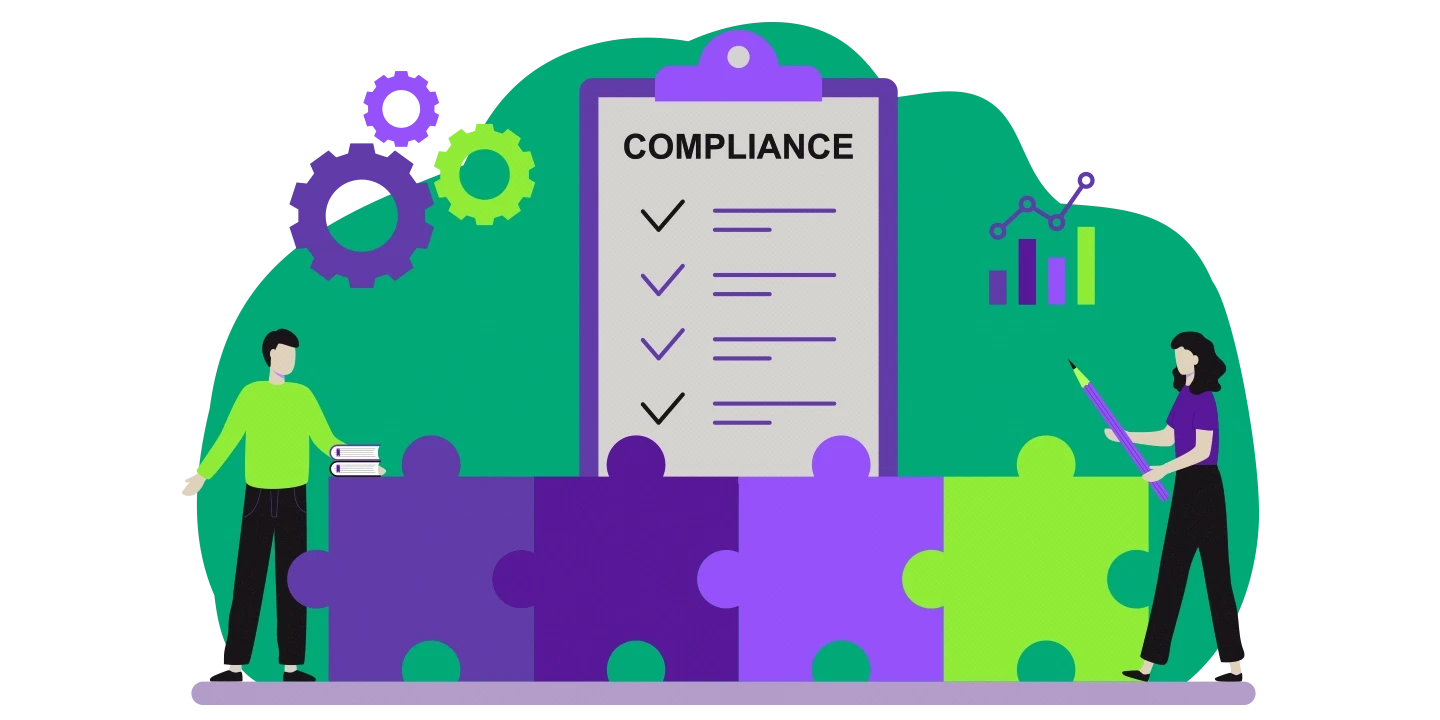
June 26, 2024
Corporate compliance: what it is and why it is so important?
Find out if your business is in accordance with good management practices.

June 26, 2024
Corporate compliance: what it is and why it is so important?
Find out if your business is in accordance with good management practices.

June 26, 2024
Corporate compliance: what it is and why it is so important?
Find out if your business is in accordance with good management practices.
In the corporate universe, one of the secrets for companies to be successful is the ability to prevent, detect, and respond to challenges with assertiveness and agility. A company that presents these three initiatives in its processes is engaged in compliance practices, an American concept that differentiates organizations worldwide.
In Brazil, the term only became known after the creation of the Anti-Corruption Law in 2013, but according to some authors, the regulatory landmark occurred in 1930, with the founding of the Central Bank of the United States, and gained strength in the country in the 1970s, with the emergence of a law that toughened penalties for companies involved in corruption scandals.

What is compliance?
Fundamental in business, compliance refers to the set of rules and procedures integrated into the organizational culture, created to keep a company in compliance with internal standards, legislation, and regulations of the industry itself.
A company can practice compliance in seven different instances simultaneously: Corporate, Legal, Tax, Environmental, Labor, Fiscal, and Digital. In this post, we will address in more depth corporate compliance, which deals with the prevention of fraud, money laundering, and anti-corruption measures.
Implementing a corporate compliance project in a corporation is not just about developing an ethics manual to be followed by employees and business partners, but about restructuring processes, behaviors, and technologies used by the company.

What are the characteristics of Corporate Compliance?
Companies that comply with good practices have competitive advantages because they are recognized for their reliability and ethical work, values that are highly attractive to investors.
By implementing a corporate compliance program, the organization can:
Identify risks – map vulnerable points, such as labor risks, contractual risks, competition, etc.;
Prevent incidents – create strategies to avoid irregularities in processes;
Resolve problems – after identifying and preventing occurrences, it is possible to foresee future conflicts and challenges and create quick responses for them;
Develop an ethics code – create a manual containing all necessary information for conducting activities in compliance with internal rules and laws;
Create a Whistleblower Channel – maintain a space for employees to report deviations from conduct and infractions of the rules;
Monitor processes – validate points for improvement and rethink strategies to achieve better results.
With the help of digital solutions and the use of Artificial Intelligence, all stages of compliance can currently be enhanced, thus promoting greater control over the performance of corporate teams.
Among the sectors that require greater attention, especially regarding monitoring, we can mention the company’s communication area, as a large part of conversations and messages now occur via corporate WhatsApp.

Compliance and monitoring of corporate WhatsApp
Monitoring team performance, the results of each promotional campaign, and compliance with company policies is also one of the functions of a compliance professional.
But in a context where work teams are decentralized and relationships and negotiations are made virtually, via WhatsApp, how can one track interactions between companies and third parties, ensure the security of information, and maintain uniformity in service among professionals?
Thanks to the Zapper platform, the first solution in Latin America for monitoring corporate WhatsApp, it is possible to supervise the accounts used by the company, whether on smartphones or tablets and computers.
Zapper is a conversational intelligence tool that tracks conversations occurring on the WhatsApp accounts used by the company and identifies keywords that indicate suspicious situations. The communication manager receives a notification and can immediately intervene in the occurrence, preventing issues such as: violations of corporate rules; inappropriate conduct; leakage of confidential data; non-compliance with laws, harassment, and shady dealings.
The information obtained from this monitoring is stored in the cloud, with restricted access and within the security requirements of the General Data Protection Law, which means an additional layer of protection for the company and users of the messaging app.

Here is a tool that benefits the compliance department of the organization and directly impacts the legal, financial, commercial, HR, customer service, and marketing areas.
Major players in the market have already understood the importance of having resources that assist in developing good practices and have adopted Zapper as a collector of valuable information from clients, suppliers, and third parties. How about joining these companies and adopting Zapper monitoring?
Click here to schedule a demonstration of the tool right now.
In the corporate universe, one of the secrets for companies to be successful is the ability to prevent, detect, and respond to challenges with assertiveness and agility. A company that presents these three initiatives in its processes is engaged in compliance practices, an American concept that differentiates organizations worldwide.
In Brazil, the term only became known after the creation of the Anti-Corruption Law in 2013, but according to some authors, the regulatory landmark occurred in 1930, with the founding of the Central Bank of the United States, and gained strength in the country in the 1970s, with the emergence of a law that toughened penalties for companies involved in corruption scandals.

What is compliance?
Fundamental in business, compliance refers to the set of rules and procedures integrated into the organizational culture, created to keep a company in compliance with internal standards, legislation, and regulations of the industry itself.
A company can practice compliance in seven different instances simultaneously: Corporate, Legal, Tax, Environmental, Labor, Fiscal, and Digital. In this post, we will address in more depth corporate compliance, which deals with the prevention of fraud, money laundering, and anti-corruption measures.
Implementing a corporate compliance project in a corporation is not just about developing an ethics manual to be followed by employees and business partners, but about restructuring processes, behaviors, and technologies used by the company.

What are the characteristics of Corporate Compliance?
Companies that comply with good practices have competitive advantages because they are recognized for their reliability and ethical work, values that are highly attractive to investors.
By implementing a corporate compliance program, the organization can:
Identify risks – map vulnerable points, such as labor risks, contractual risks, competition, etc.;
Prevent incidents – create strategies to avoid irregularities in processes;
Resolve problems – after identifying and preventing occurrences, it is possible to foresee future conflicts and challenges and create quick responses for them;
Develop an ethics code – create a manual containing all necessary information for conducting activities in compliance with internal rules and laws;
Create a Whistleblower Channel – maintain a space for employees to report deviations from conduct and infractions of the rules;
Monitor processes – validate points for improvement and rethink strategies to achieve better results.
With the help of digital solutions and the use of Artificial Intelligence, all stages of compliance can currently be enhanced, thus promoting greater control over the performance of corporate teams.
Among the sectors that require greater attention, especially regarding monitoring, we can mention the company’s communication area, as a large part of conversations and messages now occur via corporate WhatsApp.

Compliance and monitoring of corporate WhatsApp
Monitoring team performance, the results of each promotional campaign, and compliance with company policies is also one of the functions of a compliance professional.
But in a context where work teams are decentralized and relationships and negotiations are made virtually, via WhatsApp, how can one track interactions between companies and third parties, ensure the security of information, and maintain uniformity in service among professionals?
Thanks to the Zapper platform, the first solution in Latin America for monitoring corporate WhatsApp, it is possible to supervise the accounts used by the company, whether on smartphones or tablets and computers.
Zapper is a conversational intelligence tool that tracks conversations occurring on the WhatsApp accounts used by the company and identifies keywords that indicate suspicious situations. The communication manager receives a notification and can immediately intervene in the occurrence, preventing issues such as: violations of corporate rules; inappropriate conduct; leakage of confidential data; non-compliance with laws, harassment, and shady dealings.
The information obtained from this monitoring is stored in the cloud, with restricted access and within the security requirements of the General Data Protection Law, which means an additional layer of protection for the company and users of the messaging app.

Here is a tool that benefits the compliance department of the organization and directly impacts the legal, financial, commercial, HR, customer service, and marketing areas.
Major players in the market have already understood the importance of having resources that assist in developing good practices and have adopted Zapper as a collector of valuable information from clients, suppliers, and third parties. How about joining these companies and adopting Zapper monitoring?
Click here to schedule a demonstration of the tool right now.
In the corporate universe, one of the secrets for companies to be successful is the ability to prevent, detect, and respond to challenges with assertiveness and agility. A company that presents these three initiatives in its processes is engaged in compliance practices, an American concept that differentiates organizations worldwide.
In Brazil, the term only became known after the creation of the Anti-Corruption Law in 2013, but according to some authors, the regulatory landmark occurred in 1930, with the founding of the Central Bank of the United States, and gained strength in the country in the 1970s, with the emergence of a law that toughened penalties for companies involved in corruption scandals.

What is compliance?
Fundamental in business, compliance refers to the set of rules and procedures integrated into the organizational culture, created to keep a company in compliance with internal standards, legislation, and regulations of the industry itself.
A company can practice compliance in seven different instances simultaneously: Corporate, Legal, Tax, Environmental, Labor, Fiscal, and Digital. In this post, we will address in more depth corporate compliance, which deals with the prevention of fraud, money laundering, and anti-corruption measures.
Implementing a corporate compliance project in a corporation is not just about developing an ethics manual to be followed by employees and business partners, but about restructuring processes, behaviors, and technologies used by the company.

What are the characteristics of Corporate Compliance?
Companies that comply with good practices have competitive advantages because they are recognized for their reliability and ethical work, values that are highly attractive to investors.
By implementing a corporate compliance program, the organization can:
Identify risks – map vulnerable points, such as labor risks, contractual risks, competition, etc.;
Prevent incidents – create strategies to avoid irregularities in processes;
Resolve problems – after identifying and preventing occurrences, it is possible to foresee future conflicts and challenges and create quick responses for them;
Develop an ethics code – create a manual containing all necessary information for conducting activities in compliance with internal rules and laws;
Create a Whistleblower Channel – maintain a space for employees to report deviations from conduct and infractions of the rules;
Monitor processes – validate points for improvement and rethink strategies to achieve better results.
With the help of digital solutions and the use of Artificial Intelligence, all stages of compliance can currently be enhanced, thus promoting greater control over the performance of corporate teams.
Among the sectors that require greater attention, especially regarding monitoring, we can mention the company’s communication area, as a large part of conversations and messages now occur via corporate WhatsApp.

Compliance and monitoring of corporate WhatsApp
Monitoring team performance, the results of each promotional campaign, and compliance with company policies is also one of the functions of a compliance professional.
But in a context where work teams are decentralized and relationships and negotiations are made virtually, via WhatsApp, how can one track interactions between companies and third parties, ensure the security of information, and maintain uniformity in service among professionals?
Thanks to the Zapper platform, the first solution in Latin America for monitoring corporate WhatsApp, it is possible to supervise the accounts used by the company, whether on smartphones or tablets and computers.
Zapper is a conversational intelligence tool that tracks conversations occurring on the WhatsApp accounts used by the company and identifies keywords that indicate suspicious situations. The communication manager receives a notification and can immediately intervene in the occurrence, preventing issues such as: violations of corporate rules; inappropriate conduct; leakage of confidential data; non-compliance with laws, harassment, and shady dealings.
The information obtained from this monitoring is stored in the cloud, with restricted access and within the security requirements of the General Data Protection Law, which means an additional layer of protection for the company and users of the messaging app.

Here is a tool that benefits the compliance department of the organization and directly impacts the legal, financial, commercial, HR, customer service, and marketing areas.
Major players in the market have already understood the importance of having resources that assist in developing good practices and have adopted Zapper as a collector of valuable information from clients, suppliers, and third parties. How about joining these companies and adopting Zapper monitoring?
Click here to schedule a demonstration of the tool right now.
In the corporate universe, one of the secrets for companies to be successful is the ability to prevent, detect, and respond to challenges with assertiveness and agility. A company that presents these three initiatives in its processes is engaged in compliance practices, an American concept that differentiates organizations worldwide.
In Brazil, the term only became known after the creation of the Anti-Corruption Law in 2013, but according to some authors, the regulatory landmark occurred in 1930, with the founding of the Central Bank of the United States, and gained strength in the country in the 1970s, with the emergence of a law that toughened penalties for companies involved in corruption scandals.

What is compliance?
Fundamental in business, compliance refers to the set of rules and procedures integrated into the organizational culture, created to keep a company in compliance with internal standards, legislation, and regulations of the industry itself.
A company can practice compliance in seven different instances simultaneously: Corporate, Legal, Tax, Environmental, Labor, Fiscal, and Digital. In this post, we will address in more depth corporate compliance, which deals with the prevention of fraud, money laundering, and anti-corruption measures.
Implementing a corporate compliance project in a corporation is not just about developing an ethics manual to be followed by employees and business partners, but about restructuring processes, behaviors, and technologies used by the company.

What are the characteristics of Corporate Compliance?
Companies that comply with good practices have competitive advantages because they are recognized for their reliability and ethical work, values that are highly attractive to investors.
By implementing a corporate compliance program, the organization can:
Identify risks – map vulnerable points, such as labor risks, contractual risks, competition, etc.;
Prevent incidents – create strategies to avoid irregularities in processes;
Resolve problems – after identifying and preventing occurrences, it is possible to foresee future conflicts and challenges and create quick responses for them;
Develop an ethics code – create a manual containing all necessary information for conducting activities in compliance with internal rules and laws;
Create a Whistleblower Channel – maintain a space for employees to report deviations from conduct and infractions of the rules;
Monitor processes – validate points for improvement and rethink strategies to achieve better results.
With the help of digital solutions and the use of Artificial Intelligence, all stages of compliance can currently be enhanced, thus promoting greater control over the performance of corporate teams.
Among the sectors that require greater attention, especially regarding monitoring, we can mention the company’s communication area, as a large part of conversations and messages now occur via corporate WhatsApp.

Compliance and monitoring of corporate WhatsApp
Monitoring team performance, the results of each promotional campaign, and compliance with company policies is also one of the functions of a compliance professional.
But in a context where work teams are decentralized and relationships and negotiations are made virtually, via WhatsApp, how can one track interactions between companies and third parties, ensure the security of information, and maintain uniformity in service among professionals?
Thanks to the Zapper platform, the first solution in Latin America for monitoring corporate WhatsApp, it is possible to supervise the accounts used by the company, whether on smartphones or tablets and computers.
Zapper is a conversational intelligence tool that tracks conversations occurring on the WhatsApp accounts used by the company and identifies keywords that indicate suspicious situations. The communication manager receives a notification and can immediately intervene in the occurrence, preventing issues such as: violations of corporate rules; inappropriate conduct; leakage of confidential data; non-compliance with laws, harassment, and shady dealings.
The information obtained from this monitoring is stored in the cloud, with restricted access and within the security requirements of the General Data Protection Law, which means an additional layer of protection for the company and users of the messaging app.

Here is a tool that benefits the compliance department of the organization and directly impacts the legal, financial, commercial, HR, customer service, and marketing areas.
Major players in the market have already understood the importance of having resources that assist in developing good practices and have adopted Zapper as a collector of valuable information from clients, suppliers, and third parties. How about joining these companies and adopting Zapper monitoring?
Click here to schedule a demonstration of the tool right now.

Claudia Campanhã
Journalist, broadcaster, and postgraduate in social media from FAAP

Claudia Campanhã
Journalist, broadcaster, and postgraduate in social media from FAAP

Claudia Campanhã
Journalist, broadcaster, and postgraduate in social media from FAAP
Share:
Share:
Share:
Share: